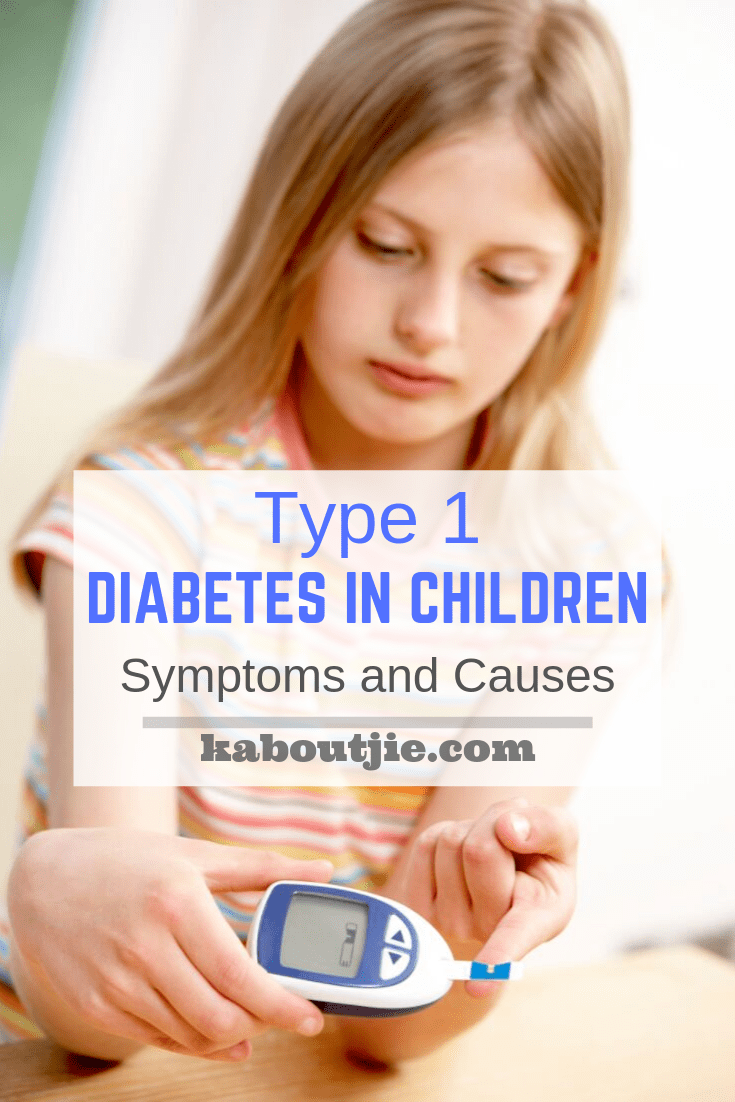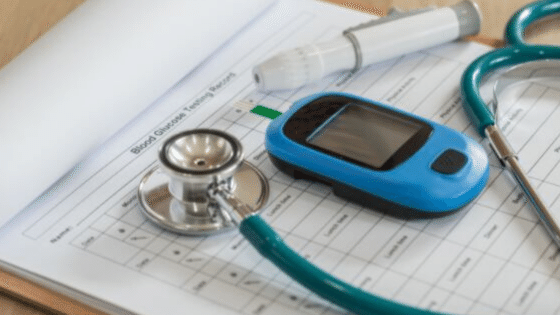Type 1 diabetes is the most common type of diabetes in children and yet most parents don’t know the symptoms of this disease. Failing to know what the warning signs are can lead to a delay in diagnosing the issue, which can make the matter more complicated.
That’s why it is essential you learn the symptoms, most common causes and know what to do next.

What Is Type 1 Diabetes?
The official name is type 1 diabetes but you may also hear this referred to as one of the following:
- Insulin Dependent Diabetes Mellitus (IDDM)
- Sugar Diabetes
- Brittle Diabetes
- Juvenile Diabetes
It doesn’t matter what name is used, the disease remains the same. Effectively, your body stops producing insulin or becomes unable to use the insulin that is produced.
Insulin is essential for converting the sugar in your blood into energy or storing it as fat, if you can’t convert the sugar your kidneys will work harder, making you urinate more to eliminate the excess sugar.
Unfortunately, this is likely to dehydrate you and cause kidney damage. The failure to regulate your blood sugar levels can have an impact on all the other functions of your body, seriously affecting your health and your ability to function properly.
If you have type 1 diabetes it is essential to monitor your blood glucose levels regularly and take insulin daily, to help your body function normally.
In fact, there are two different forms of type 1 diabetes.
- Idiopathic Type 1
This is the rarest type of diabetes, scientists still do not know what causes this.
- Immune-mediated Diabetes
If you have this your immune system is actually trying to destroy the cells in your pancreas that produce insulin. This is what is usually meant when people refer to type 1 diabetes.

The Most Common Symptoms Of Type 1 Diabetes
So how do you know if your child has type 1 diabetes? The answer is to be aware of the most common symptoms. It is worth noting that many of the symptoms of type 1 diabetes are also indications of the flu, you’ll need to rule this out first before you start considering diabetes.
- Extremely Thirsty & Frequent Urination
Because the kidneys are trying to get rid of the excess blood sugar you’ll find your child is thirsty all the time but also using the toilet a lot.
- Excessive Hunger
Excess hunger is often accompanied by weight loss, despite the excess food going into your child’s system. This is because the body is not absorbing the energy it needs, it, therefore, wants more food, although it is not of any real benefit.
- Tiredness
Because the energy from the food is not being absorbed properly your child will seem tired most of the time, they simply don’t have the energy they should have.
- Nausea & vomiting
This is a common side-effect of dehydration, which your child is likely to experience.
- Abdominal pain
The pain in their stomach is linked to excessive eating and an inability to absorb nutrients properly; This results in an ineffective digestive system which encourages bloating, indigestion, and abdominal pain.
Testing their blood sugar levels can help to identify this issue, they will be low before bed and extremely high when they wake in the morning.
- Moody
Fluctuating energy and nutrient levels means that your child’s hormones are often out of balance, making them irritable and prone to sudden mood swings.
- Rapid Breathing
Rapid breathing is a sign that their body is in distress, it is likely to be an indication that their blood sugar level is currently too high, you’ll need to administer insulin to reduce the blood glucose level.
Causes Of Diabetes in Children
The exact cause of diabetes is not actually known. However, it is believed that the tendency to develop diabetes is inherited and then triggered by a specific event.
Research is ongoing regarding what type of trigger could be the root cause but there are no clear answers yet.
What is certain is that regular exercise, even for children, will help to reduce your likelihood of developing diabetes. But, if your child has type 1 diabetes they will always have it and need to take insulin daily.
Type 1 diabetes doesn’t need to prevent a child from having a full and happy life, providing they learn how to monitor and control it from a young age.
Take Action Today
The first step in diagnosing or dealing with a diagnosis of type 1 diabetes, is to contact US MED and get a continuous glucose monitoring meter. It may seem daunting or even a drastic step but it is the easiest way to manage diabetes.
Continuous glucose monitoring means that you can access stats regarding your glucose levels throughout the day. This will help you to identify when levels rise and fall, as well as identifying the cause.
In short, this will allow you to control your eating and exercise better, ensuring that you remain in control of your diabetes instead of your diabetes controlling you.
This is the best way to monitor your blood glucose levels as you won’t need to remember to test your blood at regular intervals. At the same time, you’ll get a more accurate overall picture of your health.
Final Thoughts
Untreated diabetes can result in excessively high or low blood sugar levels. Both of these states can result in unconsciousness and even death.
It may be hard for any parent to consider their child may have type 1 diabetes. But, the sooner it is diagnosed, or ruled out, the easier it will be to deal with the issue.
This is why it is essential that you understand the symptoms and take prompt action if you think your child may have diabetes. They can be tested for it and treated, allowing them to go on and live a normal life.
Which is, after all, what every parent wants for their child.
 Kaboutjie SA Mommy Blogs by Lynne Huysamen
Kaboutjie SA Mommy Blogs by Lynne Huysamen





Thanks for a very informative article.
very informative.
good to know
Thank you for the information. My son has it and it helps a lot knowing more.